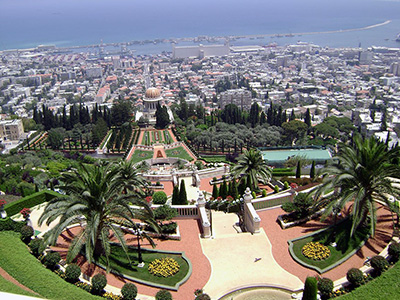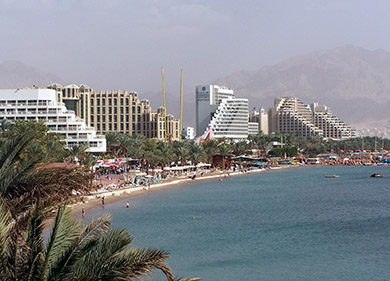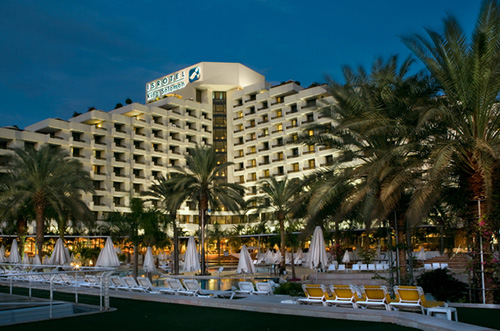 |
Israel is a parliamentary republic in the Middle East, along the eastern shore of the Mediterranean Sea. It borders Lebanon in the north, Syria in the northeast, Jordan and the West Bank in the east, Egypt and the Gaza Strip on the southwest, and the Gulf of Aqaba in the Red Sea to the south, and it contains geographically diverse features within its relatively small area. Israel is defined as a Jewish and Democratic State in its Basic Laws and is the world's only Jewish-majority state.
Following the adoption of a resolution by the United Nations, on 14 May 1948 David Ben-Gurion, the Executive Head of the World Zionist Organization and president of the Jewish Agency for Palestine, declared the establishment of a Jewish state in Eretz Israel, to be known as the State of Israel, a state independent upon the termination of the British Mandate for Palestine. Neighboring Arab states invaded immediately in support of the Palestinian Arabs. Israel has since fought several wars with neighboring Arab states, in the course of which it has occupied the West Bank, Sinai Peninsula (between 1967-1982), Gaza Strip and the Golan Heights. Portions of these territories, including east Jerusalem, have been annexed by Israel, but the border with the neighboring West Bank has not yet been permanently defined. Israel has signed peace treaties with Egypt and Jordan, but efforts to resolve the Israeli–Palestinian conflict have so far not resulted in peace.
Israel's financial centre is Tel Aviv, while Jerusalem is the country's most populous city and its capital (although not recognized internationally as such). The population of Israel was estimated in 2012 to be 7,900,600 people, of whom 5,955,200 are Jewish. Arabs form the country's second-largest ethnic group with 1,627,900 people. The great majority of Israeli Arabs are settled-Muslims, with smaller but significant numbers of semi-settled Negev Bedouins and Arab Christians. Other minorities include various ethnic and ethno-religious denominations such as Druze, Circassians, Black Hebrew Israelites, Samaritans, Maronites and others.
Israel is a representative democracy with a parliamentary system, proportional representation and universal suffrage. The Prime Minister serves as head of government and the Knesset serves as Israel's unicameral legislative body. Israel has one of the highest life expectancies in the world. It is a developed country, an OECD member, and its economy, based on the nominal gross domestic product, was the 40th-largest in the world in 2011. Israel has the highest standard of living in the Middle East.
 |
Eilat is Israel's southernmost city, a busy port as well as a popular resort, located at the northern tip of the Red Sea, on the Gulf of Aqaba. Home to 46,600 people, the city is part of the Southern Desert, at the southern end of the Arava. The city is adjacent to the Egyptian village of Taba to the south, the Jordanian port city of Aqaba to the east, and within sight of Saudi Arabia to the south-east, across the gulf. Eilat's arid desert climate and low humidity is moderated by proximity to a warm sea. Temperatures often exceed 40°C in summer, and 21°C in winter, while water temperatures range between 20 and 26°C. Eilat averages up to 360 sunny days a year. The city's beaches, nightlife and desert landscapes make it a popular destination for domestic and international tourism.
 |
The area was designated as part of the Jewish state in the 1947 UN Partition Plan. The Arab village of Umm Al-Rashrash was taken without a fight on March 10, 1949, as part of Operation Uvda. The Timna Copper Mines near Timna valley were opened, a port was constructed, the Eilat Ashkelon Pipeline laid, and tourism began. Construction of the city and the Port of Eilat began shortly after the end of the war. The port became vital to the fledgling country's development. After the 1948 Arab-Israeli War Arab countries maintained a state of hostility with Israel, blocking all land routes; Israel's access to and trade with the rest of the world was by air and sea alone. Further, Egypt denied passage through the Suez Canal to Israeli-registered ships or to any ship carrying cargo to or from Israeli ports. This made Eilat and its sea port crucial to Israel's communications, commerce and trade with Africa Asia, and for oil imports. Without recourse to a port on the Red Sea Israel would have been unable to develop its diplomatic, cultural and trade ties beyond the Mediterranean basin and Europe. This happened in 1956 and again in 1967, when Egypt's closure of the Straits of Tiran to Israeli shipping effectively blockaded the port of Eilat. In 1956, this led to Israel's participation alongside the U.K. and France in the war against Egypt sparked by the Suez Crisis, while in 1967 it was cited by Israel as an additional casus belli leading to the outbreak of the Six-Day War. Following peace treaties signed with Egypt in 1979;and Jordan in 1994, Eilat's borders with its neighbors were finally opened.
Eilat is connected to the rest of Israel and internationally by air, road and sea.
• Eilat Airport (ETH) is located in the city centre and is used largely for domestic flights.
•
International flights often use Ovda Airport (VDA) some 50 km northwest of the city.
Eilat has two main roads connecting it with the center of Israel.
There are two main border crossings: the Taba Border Crossing to Taba, and Wadi Araba Crossing to Jordan. The Port of Eilat and Eilat Marina allow travel by sea. Near-term plans also call for a rail link (Med-Red) to decrease travel times substantially from Eilat to Tel Aviv Jerusalem, via the existing line at Beer Sheba; planning is underway.
In the 1970s tourism became increasingly important to the city's economy as other industries shut down or were drastically reduced. Today tourism is the city's major source of income, although Eilat became a free trade zone in 1985. Eilat offers a wide range of accommodations, from hostels and luxury hotels to Bedouin hospitality.
| The European Champions' Cup 2012 will be played in Isrotel King Solomon Hotel, in Eilat.
Hotel rates are €120 (single room) and €80 (double room), per day, per person. Rates will reduced to €105 and €70 respectivelly for those staying a minimum of 6 nights in the hotel. This cost includes dinner on Thursday 15 November, breakfast and lunch on Friday 16, Saturday 17 and Sunday 18 November. All participants will be invited to the Prize giving ceremony and cocktails in the evening of Sunday 18 November. For room reservations, please contact:
|
 |
|
